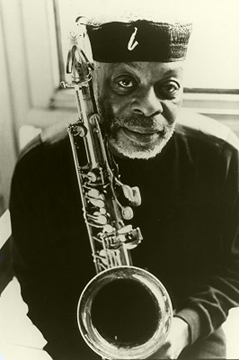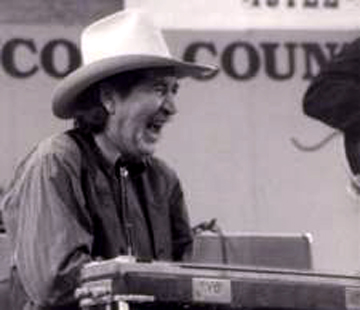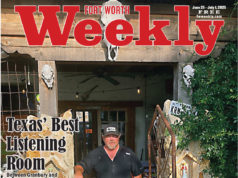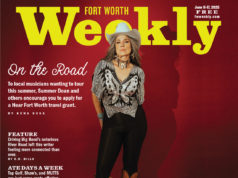 In September, when Fort Worth native and legendary free-jazz saxophonist Dewey Redman, 75, died of liver failure, Kahsen and Durrett had had enough. They weren’t going to let another local titan go gently — and quietly — into that good night. With help from a couple of other local scenesters, including music historian Marjorie Crenshaw, Kahsen and Durrett put together a tribute concert for Redman that will feature some of North Texas’ strongest and most vital players, including Fort Worthians Joey Carter (percussionist, multi-instrumentalist), Chris White (multi-instrumentalist), and Dave Williams (saxophone), Dallasites Roger Boykin (piano), James Gilyard (bass), and jazz giant Marchel Ivory (saxophone), plus Arlington pianist Daymond Callahan, Denton bassist Drew Phelps, and others.
In September, when Fort Worth native and legendary free-jazz saxophonist Dewey Redman, 75, died of liver failure, Kahsen and Durrett had had enough. They weren’t going to let another local titan go gently — and quietly — into that good night. With help from a couple of other local scenesters, including music historian Marjorie Crenshaw, Kahsen and Durrett put together a tribute concert for Redman that will feature some of North Texas’ strongest and most vital players, including Fort Worthians Joey Carter (percussionist, multi-instrumentalist), Chris White (multi-instrumentalist), and Dave Williams (saxophone), Dallasites Roger Boykin (piano), James Gilyard (bass), and jazz giant Marchel Ivory (saxophone), plus Arlington pianist Daymond Callahan, Denton bassist Drew Phelps, and others.
The setting will be Sardine’s Ristorante Italiano, where Kahsen has had a standing gig for nearly 25 years. The idea was mainly Durrett’s. He knew Redman since the early ’90s, when he was asked by Fort Worth master pianist Thomas Reese to join Redman on a Southwest tour. Redman and Durrett met, got along — musically and personally — and remained friends until Redman’s death. “We stayed in touch, but in July, I realized I hadn’t heard from him,” Durrett said. “When I found out he was dead, I was shocked. “He was a great guy and a great musician.” Durrett has been affiliated with Weatherford Community College for more than 30 years, as both an instructor and administrator, and he’s established a scholarship there in Redman’s name. At the Sardine’s show, the musicians will be asking for donations to support the fund. Durrett still isn’t sure whether the scholarship will be open to all music students or just the ones studying jazz. At the behest of Durrett and company, Mayor Mike Moncrief will also issue a proclamation in honor of Redman.
The only child of a single mother, Redman went to I.M. Terrell High School and played in the school band with three other legends in waiting: drummer Charles Moffett, saxophonist Julius Hemphill, and the man considered by some to be the chief instigator of the avant-garde jazz movement, pre-Coltrane, saxophonist Ornette Coleman. Redman graduated from Prairie View A&M, taught music in Texas public schools, and in 1959 got his master’s degree from the University of North Texas. A year later, he relocated to San Francisco, where he became reacquainted with Coleman, befriended John Coltrane, and grew into his own sound. His first album, Look for the Black Star, was released in 1966. He moved to New York City a year later and joined Coleman’s band.
For all of Redman’s accomplishments, however, he never quite got the recognition he deserved. The running gag is that he’s not even the most famous person in his family. His son, saxophonist Joshua Redman, is one of jazz’s best-selling artists and a matinee idol of sorts. Redman dumped everything into his reed — standards, ditties, rehearsed phrasings, completely improvised tonal flurries. But what came out the other end never managed to sound like anything but him. All of the disparate elements were yoked together by his rich, open signature tone. Redman was all about tone. He once said, “Technique is OK, but if you got the technique, and I got a good sound, I’ll beat you every time.” So how will a bunch of sitter-inners pay homage to a musician who’s known more for his sound than his compositional skills? “[Redman] played the emotions of the music, whether it was one of his compositions or somebody else’s,” Durrett said. “And he played it very much in his Texas style. We want to capture the creative spirit of [Redman’s] spirit.”
 Nobody is required to play any Redman originals. But Kahsen said that sax player Williams intends on doing some. The tribute here trails about a month behind a major tribute in New York City, where some of jazz’s biggest stars got together at St. Peter’s Lutheran Church and jammed. The line-up reads like a murderer’s row of talent. At the end of the night together onstage were guitarist Pat Metheny, drummer Roy Haynes, bassist Charlie Haden, and, on tenor sax, Redman’s son Joshua. Of Redman, New York Times jazz critic Ben Ratliff said, “Few jazz musicians these days have so much X factor in them, some quality that lies outside of technical discipline, harmonic scholarliness, high concept, or compositional skill. Mr. Redman was never a master of improvising through chord changes in the traditional sense. But … it was clear that he had a natural, communicative power to engage and provoke.”
Nobody is required to play any Redman originals. But Kahsen said that sax player Williams intends on doing some. The tribute here trails about a month behind a major tribute in New York City, where some of jazz’s biggest stars got together at St. Peter’s Lutheran Church and jammed. The line-up reads like a murderer’s row of talent. At the end of the night together onstage were guitarist Pat Metheny, drummer Roy Haynes, bassist Charlie Haden, and, on tenor sax, Redman’s son Joshua. Of Redman, New York Times jazz critic Ben Ratliff said, “Few jazz musicians these days have so much X factor in them, some quality that lies outside of technical discipline, harmonic scholarliness, high concept, or compositional skill. Mr. Redman was never a master of improvising through chord changes in the traditional sense. But … it was clear that he had a natural, communicative power to engage and provoke.”
Redman is just one of hundreds of jazz greats who aren’t appreciated until after they’re gone. Especially here. Last week, western swing and jazz pedal steel guitarist Tom “Wolf” Morrell died, leaving behind what may amount to the western swing equivalent of the Rosetta Stone: at least 15 volumes of music. With his band The Timewarp Tophands, Morrell started work on his How the West Was Swung series in the mid-1990s, after he realized that, while he’d been playing music his whole life, he never really committed himself to a professional solo album. Kahsen (né Case) remembers Morrell well. “I think I knew him better than most, but no one ever really knew [Morrell],” he said. “He was a very unusual man.” A defining moment for Kahsen as a musician was when he heard Morrell perform on a telecast from Panther Hall, a legendary Panther City venue. Performing with The Starlighters, Morrell was on lead standard guitar. “I was 15 at the time,” Kahsen recalled. “I thought, ‘I want to work with that man someday.’”
Kahsen met Morrell in 1964 but didn’t work with him until the 1970s, when Kahsen and his brother Jerry Case hired him and another pedal steel genius, Fort Worthian Maurice Anderson, to perform on a series of jazz records by the Case brothers, recorded on Currie Street near the Cultural District at ATP Studios (formerly Delta, formerly Buffalo Sounds). “He played on [a steel guitar] he picked out of a store window,” Kahsen said. “He played his ass off. He was spontaneous the way great jazz players are — [Anderson] was his equal technically, but he wasn’t quite as flexible or as loose as [Morrell].” Years went by before Kahsen saw Morrell again. The guitarist started stopping by Sardine’s. “He told me steel had become too mechanical for him and that he wanted to get back to standard guitar,” Kahsen recalled. “I produced his first album with him — it was understood that I’d play piano — but he chose everything else and was a wonderful producer. “It cost me a lot of money,” Kahsen continued. “He came back to me and said, ‘If you don’t mind, can we put ‘Vol. 1’ at the bottom” of the record? “And sure enough, it worked like a charm.”
Vol. 15, Relaxin’, will be out later this month, also on Weatherford’s WR Records. For more information, visit WesternSwing.net/Morrell.
A Tribute to Dewey Redman Sun 5-11pm at Sardine’s Ristorante Italiano, 509 University Dr, FW. No cover, but donations for a scholarship at Weatherford Community College in Redman’s name will be accepted. 817-332-9937.











